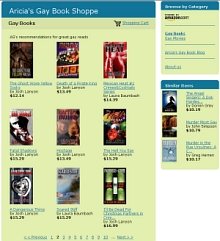Greek guys and ... Persian lads
 This is the most popular book of the "Alexander Trilogy" by Mary Renault ... but it's the fact it's become a cult-followed gay book that's made it so popular. Scholars don't like it too much! (And literary fiends don't like the first one, Fire From Heaven, too much; and gay fic fans can't seem much point in the third one ... so with this series, you really have to take what you want and leave the rest behind. If you're a Greek scholar, you'll go for the first and third. Literary fiends will go for the third. Gay fic fans will pick the second.)
This is the most popular book of the "Alexander Trilogy" by Mary Renault ... but it's the fact it's become a cult-followed gay book that's made it so popular. Scholars don't like it too much! (And literary fiends don't like the first one, Fire From Heaven, too much; and gay fic fans can't seem much point in the third one ... so with this series, you really have to take what you want and leave the rest behind. If you're a Greek scholar, you'll go for the first and third. Literary fiends will go for the third. Gay fic fans will pick the second.)
The truth is, the so-called "Alexander Trilogy" isn't really a trilogy at all. It's actually three separate books that are loosely associated because they're set in the same approximate time, and some of the same characters run through the narrative...
The first one, Fire From Heaven, was about Alexander and Hephaistion growing up in the long shadows of Philip of Macedon (Alexander's father) and his weird, shrewish mother, Olympias. (If you saw the movie, Alexander, you know them: Val Kilmer and Aneglia Jolie played thm. I wrote about Fire From Heaven yesterday. Here is the post (or you can link to it from the title in "Books Reviewed"): http://ariciasgaybookblog.blogspot.com/2008/12/legend-boys-men-alexander-and.html. The third book takes place after Alexander and Hephaistion are dead -- Funeral Games is about the political wrangling following Alexander's demise. The great leader left a vacuum behind him, and about fifty different people figured they had a chance of filling it. The first book and third book are told in third person narrative, but they are utterly unconnected, except by the time they take place in. And as for he second part of the trilogy...
The Persian Boy is told in the first person by the character known as Bagoas. He was a eunuch who fell in love with Alexander and traveled with the army on its march into India. So, if you're looking for a gay read, The Persian Boy is your title -- but you should at least know what the other two books are about, so as to put this one in context, otherwise it really seems like it's hopping about on one leg.
The story really is about Bagoas. You're about ten chapters in before be meets Alexander ... but the early part of the story is one of the most interesting segments of the book. You see the world through the eyes of a young man who's being groomed into a courtesan for the king's bedchamber. You watch the process of the grooming...
This is a very different story from anything Ann Rice had to say in Cry to Heaven. In AR's book, Tonio Treschi was almost full grown and wanted women. In The Persian Boy, Bagoas is not too unhappy to be made a eunuch and serve the king. (Here's Cry to Heaven: http://ariciasgaybookblog.blogspot.com/2008/12/gay-novel-with-history-music-blood-and.html)
The depiction of Persia, before Alexander arrives and during the war in which Persia fell, is amazing. By the time Alexander arrives, Bagoas is grown and mature enough to be interesting, and when he enters the Greek camp it doesn't take too long before Alexander notices him. Bagoas is besotted with the general, and remains devoted to him for life.
The whole story of the campaign you saw in Oliver Stone's movie is told through the eyes of this eunuch courtesan ... which puts a spin on the material which is totally different, unexpected. To me, it was brilliant to tell it this way, because it made the story fresh. It's a tale that's been told so often, it's like the Arthurian story ... everybody knows how it turns out and there's always a major challenge thrown out to new writers who have to figure out how to make it fresh.
A fair number of reviewers have problems with The Persian Boy. I can see their point some of the time ... but I don't actually agree with them. The narrative sounds like Mary Renault is so obsessed with Alexander, she only knows how to worship him. Is this so -- or is it Bagoas who worships him? I think it's Bagoas. In his world, he understood "god kings." You did worship the king. MR wrote this into his thoughts and behavior.
Other reviewers have problems with the fact she has Alexander fancy Bagoas and be seduced by him. There's still a strong movement that wants to "defend" Alexander against the charge of being gay! Mary Renault was a "gay advocate" at a time when you were a voice crying in the wilderness if you wrote positive material abut gay people, or put them in heroic roles. I guess this is what reviewers and critics mean by her having "gay agendas." Writing in 2008, it's all a bit sad now.
The book is vast in scope, and yet is only about 350pp long, which means you don't get a fully developed examination of any particular event. You're like Bagoas, drifting through history, touching down here and there on a mighty journey. This is probably a good thing, because readers today don't have that much time or attention! I want to say, "the book could have been steamier," but it was published in 1972. Any more explicit than this, dealing with gay characters and situations, and it'd have either been banned, or classified as porn. So you do have to use your imagination a good bit ... and it helps if you've seen the movie, Alexander, because a lot of the background and details of "things" will be easy to visualize. MR doesn't spend a whole lot of time describing what things actually are, or look like. You're supposed to know. Well ... watch the DVD, and then you will!
I want to say, "the book could have been steamier," but it was published in 1972. Any more explicit than this, dealing with gay characters and situations, and it'd have either been banned, or classified as porn. So you do have to use your imagination a good bit ... and it helps if you've seen the movie, Alexander, because a lot of the background and details of "things" will be easy to visualize. MR doesn't spend a whole lot of time describing what things actually are, or look like. You're supposed to know. Well ... watch the DVD, and then you will!
Does the book have a downside? To me, yes -- but a lot of people will tell you this 1) doesn't matter, or 2) what are you talking about?, or 3) what are you complaining about? Here's my own problem with the book: when I think about Alexander, I'm always drawn to the relationship between him and Hephaistion. But in The Persian Boy this relationship seems to have disappeared. Alexander goes with Bagoas instead, leaving Hephaistion I'm-not-sure-where. It's a very difficult question. Scholars will tell you flat out, it's only an assumption, an educated guess, that there was anything between Alexander and Hephaistion anyway! And if you're not at least a bit of a scholar, you don't know enough about this to care one way or another.
The other thing is, Mary Renault probably wanted to write about Alexander's gay aspect, and in 1970ish it might have been too controversial to write about him having a relationship with another guy who was older than himself by a small amount. It was safer to sneak the gay scenes in, if she wrote about Alexander and a eunuch. This, I understand. But wouldn't it have been nice to have a depiction of the real thing, the relationship between Alexander an Hephaistion? You can dream...
The Persian Boy is highly recommended. A great historical, even before you look at it as a gay book too. You can get multiple editions and most of them are available through Amazon. AG's rating: 4 out of 5 stars.









4 comments:
Hi there-- I just read The Persian Boy-- and am reading it again. In the wake of the recent rash of Gay suicides, I kept thinking, "what if those young me had had the story of Alexander the Great as a frame for their existences as Gay?"
Anyway, the book was wonderful.
Great piece... It's posters like you, who make life worth living. Also looking forward for more posts about that.
Dear Aricia,
I just found this article. I don't know anything about you more than what I just read, and your review of FFH, but I read The Persian Boy when it came out, as I did with all the Renault books since 1960. Try The Charioteer. I wrote to Ms. Renault in 1977 about leaving things out and confusing this teen (as I was then). She said she might have been more explicit, but did not care to be as graphic writing would have turned her off. What she did write had the opposite effect on me. I identified with Bagoas, and still read TPB today, even though I'm a woman. It helped me understand my gay friends and relatives better. Recall that Bagoas was not homosexual by choice; he was forced into it and made the best of it. With Alexander's parents, it is amazing Alex was able to stand being with a woman at all. Bagoas became home to him, but Hephaistion was his soul mate. He had enough love for both, and his army as well. Three lovers there, not to mention his wives. He was brought up to think men were the only proper people to love. Women were for making children.
Thank you again for your insightful review.
Penina
I didn't know to sign in first. I wrote the above comment.
Penina
Post a Comment